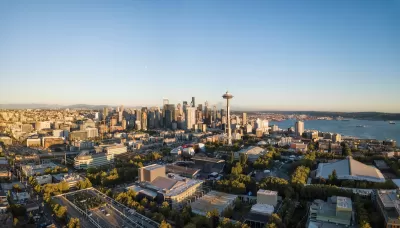As more and more cities look to adapt vacant office buildings into homes, a new analysis from Urban Institute says some cities will benefit more than others.

A new analysis from the Urban Institute takes a look at which cities will get the biggest bang for their buck out of office to residential conversions. According to UI Research Associate Jorge González-Hermoso, facing unprecedented commercial vacancy rates and a national shortage of approximately four million homes, local governments across the country are incentivizing adaptive reuse of vacant offices into housing. “One estimate points to 58,000 new housing units currently being built in the US from repurposed office space,” he writes.
But just as some buildings are better suited than others to residential conversion (e.g., inoperable windows and larger floorplans that decrease window access), some cities stand to benefit more from conversion incentive policies than others.
To determine which, González-Hermoso built a conversation disposition index based on various factors illustrating office distress and housing supply need. According to his analysis, these five places are primed for office to residential conversion:
- San Mateo County, California
- Seattle
- Phoenix
- Atlanta
- San Francisco
The article also offers tips on how stakeholders can promote adaptive reuse of office space, including land-use reform, building code updates, streamlined permitting processes, and tax credits or abatements.
FULL STORY: Which Cities Would Benefit Most from Converting Offices into Housing?

Maui's Vacation Rental Debate Turns Ugly
Verbal attacks, misinformation campaigns and fistfights plague a high-stakes debate to convert thousands of vacation rentals into long-term housing.

Planetizen Federal Action Tracker
A weekly monitor of how Trump’s orders and actions are impacting planners and planning in America.

In Urban Planning, AI Prompting Could be the New Design Thinking
Creativity has long been key to great urban design. What if we see AI as our new creative partner?

King County Supportive Housing Program Offers Hope for Unhoused Residents
The county is taking a ‘Housing First’ approach that prioritizes getting people into housing, then offering wraparound supportive services.

Researchers Use AI to Get Clearer Picture of US Housing
Analysts are using artificial intelligence to supercharge their research by allowing them to comb through data faster. Though these AI tools can be error prone, they save time and housing researchers are optimistic about the future.

Making Shared Micromobility More Inclusive
Cities and shared mobility system operators can do more to include people with disabilities in planning and operations, per a new report.
Urban Design for Planners 1: Software Tools
This six-course series explores essential urban design concepts using open source software and equips planners with the tools they need to participate fully in the urban design process.
Planning for Universal Design
Learn the tools for implementing Universal Design in planning regulations.
Appalachian Highlands Housing Partners
Gallatin County Department of Planning & Community Development
Heyer Gruel & Associates PA
Mpact (founded as Rail~Volution)
City of Camden Redevelopment Agency
City of Astoria
City of Portland
City of Laramie





























